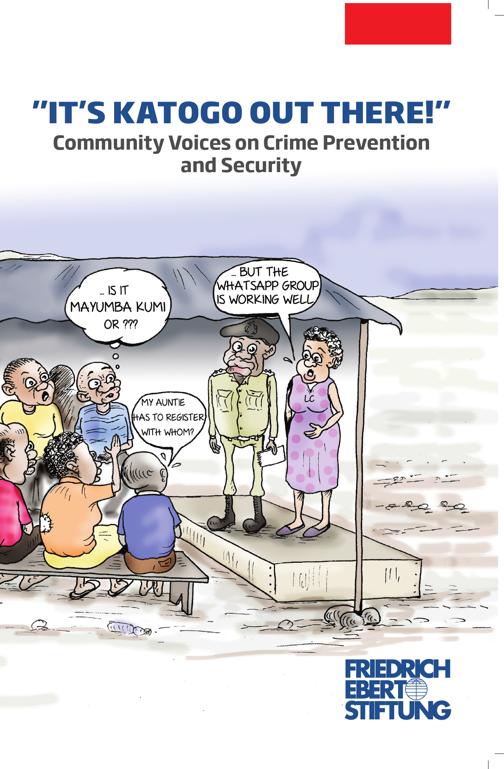Publikationen der Stiftung"It's katogo out there!" Titel
Titelaufnahme
- Titel"It's katogo out there!" : community voices on crime prevention and security
- Körperschaft
- Erschienen
- Umfang1 Online-Ressource (53 Seiten) : Illustration
- SpracheEnglisch
- DokumenttypDruckschrift
- Schlagwörter
- Geografika
- ISBN978-9970-535-04-0
- URN
- Das Dokument ist frei verfügbar
- Nachweis
- Archiv
This publication presents key results of the community policing dialogue project of the Friedrich-Ebert-Stiftung (FES) Uganda office between June 2016 and July 2017. The project was motivated by increasing security concerns in the public and a wider debate over the controversial crime preventers that had been (re-)introduced under the banner of community policing by the police in 2014. In June 2016, FES convened a national security dialogue between policy makers, practitioners, academics, and civil society that aimed to arrive at a common understanding of community policing in Uganda and associated roles and responsibilities of police and citizens that is essential harmonious and effective community policing. The second phase of the dialogue project went to the community level. The aim was to give voice to community stakeholders in support of the strategy and policy development for community policing in police and government.1 Key questions guiding the project were: * How is modern community policing conceptualized and implemented in Uganda? * Who are the actors in community policing and what are their roles, responsibilities and relationship between them? * How should community policing be designed to effectively aide crime prevention and foster a relationship of mutual confidence and trust between police and communities? Chapter two provides a summary of the key results of the project. The following two chapters explore international principles and values of community policing, the history of and the legal and institutional framework for community policing in Uganda. The main body of the report (chapter five) primarily draws on data gathered in the course of thirteen local dialogues held in Kampala�s five divisions, in Kabarole district, Bushenyi, Kumi, Kamuli and Kakiri. The dialogues focused on crime prevention and neighbourhood security. Each of them brought together twenty to forty community leaders and community members, such as KCCA councillors, LC1 Chairpersons, market vendors, boda boda riders, teachers, and so on, as well as police. The dialogues were coordinated with and co-hosted by the local political and administrative authorities, the police and the DISO. Notably, there was no significant difference in the experiences reported by participants in Kampala Metropolitan and the five upcountry towns and districts in rural settings. The report is further informed by the national dialogue that took place in June 2016, and additional interviews conducted with selected stakeholders.
1 All dialogues were held in English and the dominant local language to allow community members to express themselves comfortably. FES worked with two experienced local consultants who moderated groups, contributed to research and this publication, and advised the project. Upcountry dialogues were conducted with the help of local partners.
